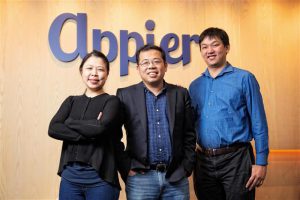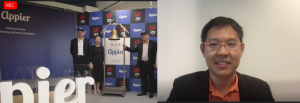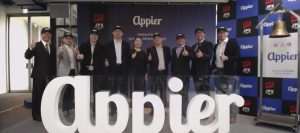Highlights
- There’s a certain stability and longevity that investing in AI expertise brought to Appier than investing in say only an AI-driven marketing product or in a certain market like the US or Taiwan would have brought.
- The combination of riding the AI wave on the right beach (market) and riding this wave for the long haul put them in the right position to eventually take advantage of the COVID digitalization rush.
- Sometimes all it takes is the first check to open doors for more investors and even customers, but what’s more important is founder-investor fit.
- Having world-class talent in AI was not going to be enough to sell AI solutions to a global market. They needed to direct this talent with the needs of the industry and end-customers.
- Using off-the-shelf solutions is not always a bad thing, but if your company’s moat lies in technology and the ability of company talent to leverage the tech for specific clientele, then in-house strengthens that moat.
Taiwan-based global AI solutions company Appier (TSE: 4180) today made its IPO listing on Mothers market on the Tokyo Stock Exchange (TSE), marking a new chapter in the life of the company. It’s been almost a decade since Appier was founded, and with this milestone comes a great opportunity to look back at their story, and piece together some of the important lessons founders and tech companies can take from Appier’s journey and how it has led to their debut on the public markets.
Investing in AI expertise
In much of Appier’s press throughout its nine-year history, CEO Chih Han Yu’s decade-long background as an AI and robotics researcher at Harvard and Stanford is often mentioned, and for good reason. What has made Appier what it is today is less any single product, market, or person, and more the AI expertise that Chih and his co-founders brought to the company — the DNA of Appier.
Although Appier initially found its footing as a scalable tech company with CrossX, a cross-platform advertising engine, it wasn’t always focused on marketing technology, nor was this the limit of the company’s repertoire. CEO Chih Han Yu and CTO Joe Su originally came together to develop games, but what the publishers they pitched to were more interested in was AI after learning about their backgrounds, and how their skill set could help them with their advertising. Chih Han shares about this experience in this article from Tech in Asia published following their Series A round from Sequoia Capital:
“Back when we were making games, we would use a pitch deck and show it to different publishers. In the last slide i would talk about my experience in AI, just so I could talk a little about some of the cool things I did. But everyone we pitched to became curious and started asked questions about AI. Eventually, we realized our publishers and media partners were relying on us to help with their advertising problems. We started to study the advertising world and realized that it’s basically a playground for big data guys like us.”
While this experience brought Chih Han and Joe to what we’ll call founder-market fit (i.e. discovering that founders are best suited to solve a certain market problem), getting to CrossX as it launched in 2014 was not easy either. It took Appier eight unsuccessful product iterations before they finally found product-market fit with CrossX, as COO and co-founder Winnie Lee shares in an article in Digitimes. This strengthened their resolve that their expertise in AI was the way to go moving forward.

Appier co-founders (from left): COO Winnie Lee, CEO Yu Chih-han, and CTO Joe Su Photo: Michael Lee, Digitimes, February 2020
And as Appier expanded globally across 12 cities with its AI-based advertising product over the next three years, it found great success with consumer brands, e-commerce companies, and mobile game developers. In 2017, the company sought to expand their target market segments with the launch of the AI-based data science platform Aixon. Appier recognized that the demand for AI services was rising beyond the advertising pain points the founders originally encountered five years ago.
Then in 2018 and 2019, Appier began expanding its product offerings through acquisitions. The first was with an Indian startup QGraph, which led to the launch of AI-driven proactive customer engagement platform AiQua (e.g. for testing and issuing prompts like push notifications or in-app messages for better conversion). Then a year later, Appier acquired Japan-based Emin and launched augmented marketing and customer targeting solution AiDeal.
As their suite of products and value propositions grew throughout the years and reached different types of companies across the globe, one thing remained constant and a foundation for their growth: Appier’s AI expertise. There’s a certain stability and longevity that investing in AI expertise brought to the company than investing in say only an AI-driven marketing product or in a certain market like the US or Taiwan would have brought.
And part of investing in expertise is also investing in the ability to communicate it. While tech solves the pain points, sales is what gets customers on board to solve that pain point with that particular technology. COO Winnie Lee shares on the 14 Minutes of SaaS podcast by AppSelekt why, even though she was a biomedical scientist by profession, Chih and Joe brought her in the team.
“There’s actually a clear reason that they recruited me rather than other people. So I think, you know, that our founding team is a pure engineers’ and scientists’ team. And I am also a scientist. But because I am in biomedical science – I think you’re probably also familiar with people within this field – so compared to companies like this I would say biomedical scientists are a little better at communication in general. And that’s a big part of the reason why they decided to recruit me because, you know, in the early days when they were trying to build products, you also need people who can actually communicate the ideas and share with a general audience in layman’s terms – that people can really understand fully. So that’s where my contribution can come into play.”
And this combination of people who knew the technology deeply and people who could market and communicate it to a mass audience ultimately shaped the DNA of Appier and the people they subsequently brought into the team.
Riding the long wave on the right beach
While investing in expertise has made Appier an enduring company, the fact that this expertise was AI also played a huge role in the kind of scale they achieved over this past decade, which has been a hallmark period for AI digitalization, especially in Asia. Perhaps Appier themselves may have had a hand in driving this trend as they expanded rapidly across East and South Asia in their first three years, but regardless of how it came to be, timing played perfectly for the company.
Venture capitalists often talk about big picture technology developments in waves, and usually conclude that the best founders and companies are those that are either making the waves or riding the waves long before they reach the shore. What is less talked about is that sometimes these waves don’t crash all in one go, and sometimes you have long waves that come in slowly.
So Appier didn’t just make a wave or ride it early on — they continue to ride it and make sure it spreads to as wide of a beachhead as possible. And in this regard, the nature of AI helps immensely, as Appier’s growth is not tied to its geography nor centralized around its headquarters in Taipei. The founders shared the view even early on that Appier should become global in reach, not just because of the market potential or the borderless nature of their expertise, but also because the data needs to be big in order to best inform their products.
That said, it is also important to note that making their waves first in the Asia Pacific region, compared to say if they had started in the US or Europe, also put them in a better position to be a market leader. In 2019, the US and UK accounted for around half of the US$121 billion spend on marketing technology, and that opened up a less competitive space in Asia for a company like Appier to dominate. This gave them the space to expand quickly across Asian cities especially pre-2017 when they were just focused on growing the reach of CrossX.
The combination of riding the AI wave on the right beach (market) and riding this wave for the long haul put them in the right position to eventually take advantage of the COVID digitalization rush. And just like that, right in the middle of the pandemic in June 2020, Appier announced their expansion to Europe with the appointment of new global sales and enterprise sales leaders.
“As we move towards economic recovery following the height of the global pandemic, we are at a critical moment to help businesses accelerate their digital transformation and increase online efficiency by leveraging AI technology. We are committed to bringing our solutions to more customers in APAC and Europe who are serious about improving customer engagement to drive business growth,” Chih says in an article covering the announcement.
Sometimes all it takes is the first check
While driving the AI digitalization wave in Asia, Appier had also set off another wave — that of successive funding rounds. It wasn’t always that easy to fundraise, however. Over the first two years with only their headquarters in Taiwan it had been difficult to convince international VC firms to invest in AI startups (at that time it was even more difficult to win over enterprise clients), according to Winnie Lee in this article.
Enter Sequoia Capital. When the company opened their first branch office in Singapore, the 42-year-old, global VC firm also had its Singapore office in the same building. According to Chih in the Tech in Asia article announcing their Series A round, “We weren’t thinking about doing any fundraising back then, we were just planning on bootstrapping the company and growing on our own revenue.” Incidentally Appier was also Sequoia’s first — first Taiwanese startup in its portfolio.
That US$6 million Series A round fueled Asia expansion and R&D, but more than the capital, Appier was also able to leverage on the connections the global VC firm offered. As Chih adds, “Sequoia impressed us with their global connections and experience building world-class companies. They [introduced] us to partners that would normally take us years to meet.”
Over the next three years, Appier raised three successive rounds of funding: US$42.5 million in two rounds of Series B and a US$33 million Series C round. Then towards the end of 2019, right before the pandemic, they closed an US$80 million Series D round. Among their investors include Softbank Group, LINE Corp, Naver Corp, TGVest Capital, and Temasek’s Pavilion Capital. Insignia Ventures joined Appier’s cap table in their 2019 Series D round. In total the AI company raised US$186 million dollars, and was recognized as one of the two first Taiwanese unicorns in 2020 by the Ministry of National Development Council in Taiwan.
For a Taiwanese tech company that was initially planning to bootstrap and grow purely on revenue, it is remarkable how much and from whom they raised successively after that first round in 2014. Sometimes all it takes is the first check, but what’s more important is that there was founder-investor fit. The VC saw the long-term potential of a company investing in its ability to build AI solutions for a wide array of customers, and Appier saw the potential customers and investors they could bring in partnering with Sequoia.
Directing AI expertise with market insight
Even if Appier had in its DNA AI-expertise, this DNA was ultimately informed less by the technology and more by the market, which paid dividends in securing the more than 800 customers and brands they’ve served in the past nine years. Having world-class talent in AI was not going to be enough to sell AI solutions to a global market. They needed to direct this talent with the needs of the industry and end-customers.
“Initially, when we started our business, we actually didn’t know, you know, what kind of questions we should go after. The first few ones were really a mess. So we figured there are certain types of questions that we can answer well. And, you know, this journey and those trial-and-error experiments kind of shaped our tune right now into a very market-driven innovation type of team…Normally, you know, people [with a] very solid tech background, they always want to build core technology. It’s all about core technology. Don’t take me wrong, we have a very solid tech team, so we still want to build core tech. But we realised really early-on in those pivots if this core technology cannot address some very important questions for end users or an industry, then you know like this core tech not really make a good impact. So therefore, that’s the reason why nowadays the approach we take is very market-driven,” Winnie Lee shares in the 14 Minutes of SaaS podcast by AppSelekt.
Building a moat with “localized tech”
Related to becoming market-driven when it came to developing new technologies, Chih also recognized that in order for their products to consistently deliver the optimal performance for a wide range of use cases, they couldn’t afford to use “off-the-shelf” solutions. Not only would going “off-the-shelf” run contrary to their company DNA investing in AI expertise and talent, but Chih also points out in this VentureBeat article that “off-the-shelf” algorithms don’t cope as well in the real-world environment as those that they’ve developed in-house. Their machine learning models are trained with data from websites, apps, and CRM software, improving the model over time.
“Our clients need to be able to use our solutions to manage many different and fast-moving scenarios — different KPIs, varying data sources, etc. This means that our scientists spend a lot of time making sure our deep learning solutions can deliver optimal performance in any situation that our clients might face,” says Chih on VentureBeat.
This consistency in developing everything in-house enables the company to remain on top of the technology that not only makes Appier the company that it is today but also the company it can be in the future. Using off-the-shelf solutions is not always a bad thing, but if your company’s moat lies in technology and the ability of company talent to leverage the tech for specific clientele, then in-house is the way to go.
This is analogous to Southeast Asia companies that are able to adapt their products and business models to the local market creating a “localization moat” against more global competitors. In a way, Appier localized its own technology for its clients to be more flexible to their different needs and scenarios.
***
As Appier begins a new chapter in its growth as an AI company with its listing on the Tokyo Stock Exchange, it once again furthers the impact of the AI wave in business. Not only has the company been driving AI digitalization in marketing for various brands and companies across the globe, but also paving the way for a new generation of AI startups from Asia to raise bigger rounds and go public and even boosting the appeal of Asian exchanges like TSE to host tech companies on their public markets.
*Insignia Ventures Partners is an investor in Appier
**Other info came from Appier’s company page apart from the ones linked in the piece.
***The content of this article is for informational purposes only, should not be taken as legal, tax, or business advice or be used to evaluate any investment or security, and is not directed at any investors or potential investors in any Insignia Ventures fund.
Paulo Joquiño is a writer and content producer for tech companies, and co-author of the book Navigating ASEANnovation. He is currently Editor of Insignia Business Review, the official publication of Insignia Ventures Partners, and senior content strategist for the venture capital firm, where he started right after graduation. As a university student, he took up multiple work opportunities in content and marketing for startups in Asia. These included interning as an associate at G3 Partners, a Seoul-based marketing agency for tech startups, running tech community engagements at coworking space and business community, ASPACE Philippines, and interning at workspace marketplace FlySpaces. He graduated with a BS Management Engineering at Ateneo de Manila University in 2019.

